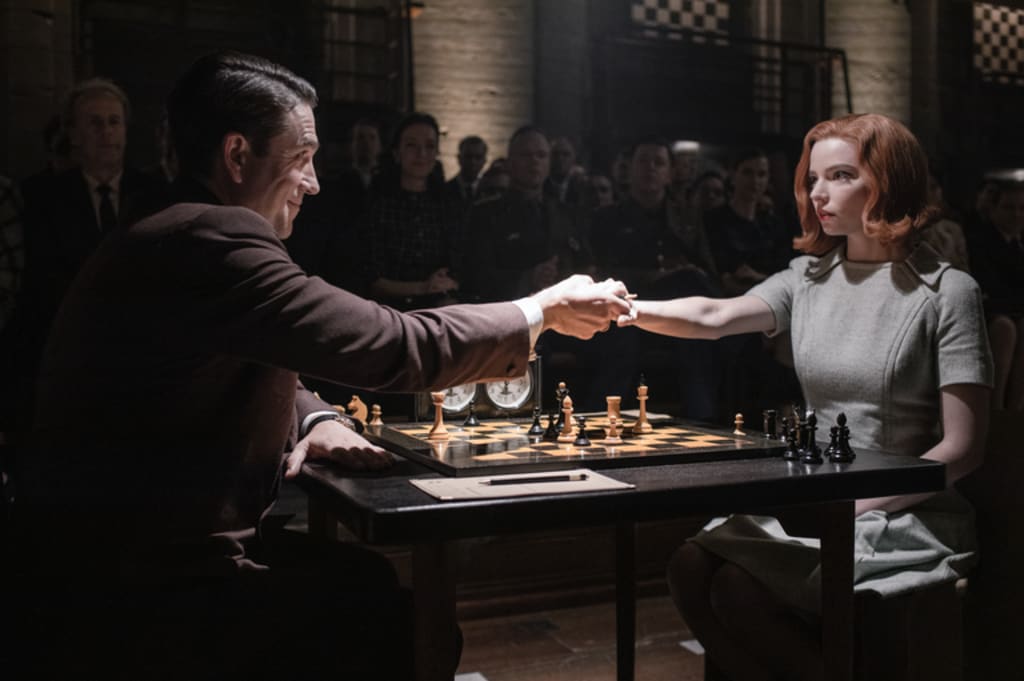What The Queen’s Gambit Got Right
Player vs. Player, Not Russia vs America

Warning: Many spoilers ahead!
Everyone is talking about The Queen’s Gambit. Sixty Two million households tuned into this Netflix Limited Series, making it their most popular ever. Reports show that girls are interested in playing chess! Girls! Chess! What’s not to like?
I have been watching the gushing reviews, and I must admit that they’ve given me pause. I cannot seem to get past the fact the hero is a pill popping/alcoholic. You could say not her fault because: a) the orphanage gave her pills and b) her adopted mom was a lush. Still, it is a great story. An abandoned orphan learns to play chess from the janitor in the basement of the orphanage. She clearly has aptitude and there is even a brief reference to her mother being a brilliant mathematician. She ‘sees’ the pieces moving. She reads every chess book she can get her hands on. She ends up entering the world of competitive chess at the tender age of 13, a world exclusively occupied by men. A world that eventually accepts her, even helps her.
The series plods on, as she gets older and keeps playing chess and popping pills and drinking. I don’t want to add any more spoilers here, so I’ll skip to the end of the story, which was my favorite part.
In the final episode, she travels to Moscow to play in an invitational competition which includes the world champion, Vasily Borgov. What I loved so much about this episode is the way it portrayed the Russian people. The story really captured their essence and showed their warmth, something so many other stories have failed to do.
It’s important to remember that this series takes place during the Cold War. America and Russia were enemies. Americans believed that Russians could launch nuclear missiles, pointed at the US, at any time. American school children were hiding under desks. The Soviets had suppressed the practice of religion, closed churches and arrested religious leaders. All things Russian were bad. Unfortunately, what many Americans did not realize is that most of the Russian people were not Soviets.
Elizabeth Harmon, the hero of the story, did not care about any of the propaganda. She refused funding, for her trip, from the Christian Cavalcade when she realized that they wanted her to officially support their Evangelical Christian beliefs and Anti-Communism stance. She was going to play chess. That was all.
This really hit home for me. Regardless of what anyone tells you, the churches in Russia may have been physically closed, but the people had just taken it ‘underground’. How else can you explain how quickly the churches rebounded once the Soviets were gone? Almost all my Russian friends, who grew up in the Soviet era, had been baptized. I spent some time in Russia after the Soviet Union broke up, working as a humanitarian clown, with children and adults in hospitals and orphanages. We came across many Evangelical missionaries, who felt that the Russians were ripe for conversion, because of the policies of the former government. This always made me feel uncomfortable because they were preaching to people who were already Christians and who had gone through so much suffering to keep their church alive. Brava Harmon, for refusing to be used as a mouthpiece for something you did not believe in.
When Harmon arrives in Moscow, the Russians are clearly taken with her. They give her the nickname ‘Liza’ and they watch her matches on remote boards wait outside for photos and autographs. They are rooting for her because they admire her. As she progresses through her matches, it becomes clear that the Russian chess players admire her as well. Here is what I love about this: it has nothing to do with Soviets vs. Americans. It is only about chess.
This confirms everything I have learned about the Russian people. They are warm and passionate about the things they love. They love chess – it is a national pastime for them. Therefore, they warmly accepted Harmon, an exceptional chess player. This is what so many people do not understand about the Russians. It was wonderful to see them portrayed in such a realistic way, instead of as caricatures.
Big Spoiler: The last episode ends with Harmon heading to the airport, with her CIA escort. He informs her that she will be expected to attend a reception at the White House and be photographed with the President. She asks the limo to stop and she exits and walks into a park, filled with none other than Russian chess players. It reminded me of Washington Square. They recognize and welcome her, with open arms, and one older gentleman offers her the seat across from him. Her last line is ‘Поиграем' or Let's Play!
Postscript: I remember being on a boat, floating down the Volga River, drinking пиво (beer) with my Russian friends. As we drank, we started to talk about growing up in our respective countries. We Americans told of hiding under our school desks for air raid drills and we all rolled with laughter. As if our little desks would protect us. Two of the Russians burst into a rather spirited version of Soviet song they were forced to sing every morning in school. More laughter. More пиво. What we discovered was we were more alike than we thought. We had all been told mistruths by our governments. One of the Russians told a joke, in Russian, and they all got hysterical. One friend tried to translate the joke to English, but it wasn’t funny. The same thing happened when we tried to translate an English joke to Russian. Wasn’t funny. Oh well. At least we still had пиво.






Comments
There are no comments for this story
Be the first to respond and start the conversation.